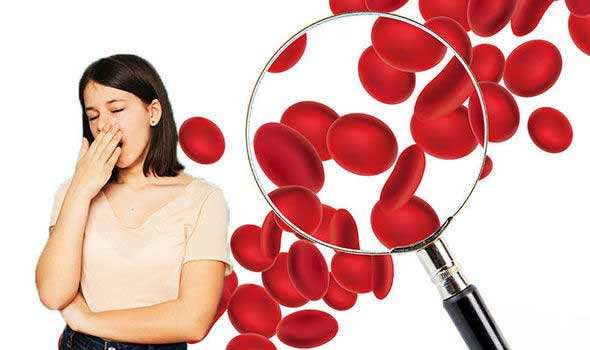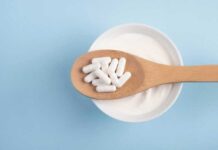
IRON deficiency anemia is caused by a lack of iron in the body. The deficiency can be treated by consuming more iron, either in your diet or with tablets. This iron-rich ‘superfood’ could help reverse the symptoms of anemia.
A lack of iron in the body can be caused by blood loss or pregnancy, or it could just be from not eating enough iron-rich foods.
There are certain foods and drinks you should consume more of and cut down on in order to boost iron levels.
One thing you should include more of in your diet is kale.
Kale is often hailed as being a ‘superfood’ – foods which are thought to have a very high nutritional value.
If your diet is partly causing your iron deficiency anaemia, your GP will tell you what foods are rich in iron so you can eat more of them. NHS
According to the NHS, curly kale, as well as other dark green leafy vegetables like watercress, are high in iron and could help to reverse an iron deficiency.
Other iron-rich foods include cereals and bread with extra iron in them, known as fortified cereals or bread.
Wholegrain, like brown rice, is also high in iron, as are nuts and soybean flour.
In addition, meat and liver contain a lot of iron, although the NHS advises avoiding liver during pregnancy.
Pulses, such as beans, peas, and lentils are also iron-rich, as is dried fruit.
According to the NHS, adult men need 8.7mg of iron a day.
Women between the age of 19 and 50 need 14.8mg of iron a day, but this drops to 8.7mg for women over 50.
This is due to women over the age of 50 going through the menopause and not losing blood through menstruation anymore.
On the other hand, if you have an iron deficiency, you should eat and drink less tea, coffee, milk and dairy.
You should also eat less food with high levels of phytic acid – such as wholegrain cereals.
This is because large amounts of these foods and drinks make it harder for your body to absorb iron.
“If your diet is partly causing your iron deficiency anaemia, your GP will tell you what foods are rich in iron so you can eat more of them,” said the NHS.
Symptoms of iron deficiency include tiredness and lack of energy, shortness of breath, noticeable heartbeats, and pale skin.
If you have anaemia, it is important to treat it, as otherwise you can be more at risk of illness and infection.
This is because a lack of iron affects the immune system.
You are also more at risk of developing heart and lung complications.
Important Notice: This article was originally published at www.express.co.uk by Karolina Kaminska where all credits are due.
Disclaimer
The watching, interacting, and participation of any kind with anything on this page does not constitute or initiate a doctor-patient relationship with Dr. Farrah®. None of the statements here have been evaluated by the Food and Drug Administration (FDA). The products of Dr. Farrah® are not intended to diagnose, treat, cure, or prevent any disease. The information being provided should only be considered for education and entertainment purposes only. If you feel that anything you see or hear may be of value to you on this page or on any other medium of any kind associated with, showing, or quoting anything relating to Dr. Farrah® in any way at any time, you are encouraged to and agree to consult with a licensed healthcare professional in your area to discuss it. If you feel that you’re having a healthcare emergency, seek medical attention immediately. The views expressed here are simply either the views and opinions of Dr. Farrah® or others appearing and are protected under the first amendment.
Dr. Farrah® is a highly experienced Licensed Medical Doctor certified in evidence-based clinical nutrition, not some enthusiast, formulator, or medium promoting the wild and unrestrained use of nutrition products for health issues without clinical experience and scientific evidence of therapeutic benefit. Dr. Farrah® has personally and keenly studied everything she recommends, and more importantly, she’s closely observed the reactions and results in a clinical setting countless times over the course of her career involving the treatment of over 150,000 patients.
Dr. Farrah® promotes evidence-based natural approaches to health, which means integrating her individual scientific and clinical expertise with the best available external clinical evidence from systematic research. By individual clinical expertise, I refer to the proficiency and judgment that individual clinicians acquire through clinical experience and clinical practice.
Dr. Farrah® does not make any representation or warranties with respect to the accuracy, applicability, fitness, or completeness of any multimedia content provided. Dr. Farrah® does not warrant the performance, effectiveness, or applicability of any sites listed, linked, or referenced to, in, or by any multimedia content.
To be clear, the multimedia content is not intended to be a substitute for professional medical advice, diagnosis, or treatment. Always seek the advice of your physician or other qualified health providers with any questions you may have regarding a medical condition. Never disregard professional medical advice or delay in seeking it because of something you have read or seen in any website, video, image, or media of any kind. Dr. Farrah® hereby disclaims any and all liability to any party for any direct, indirect, implied, punitive, special, incidental, or other consequential damages arising directly or indirectly from any use of the content, which is provided as is, and without warranties.








